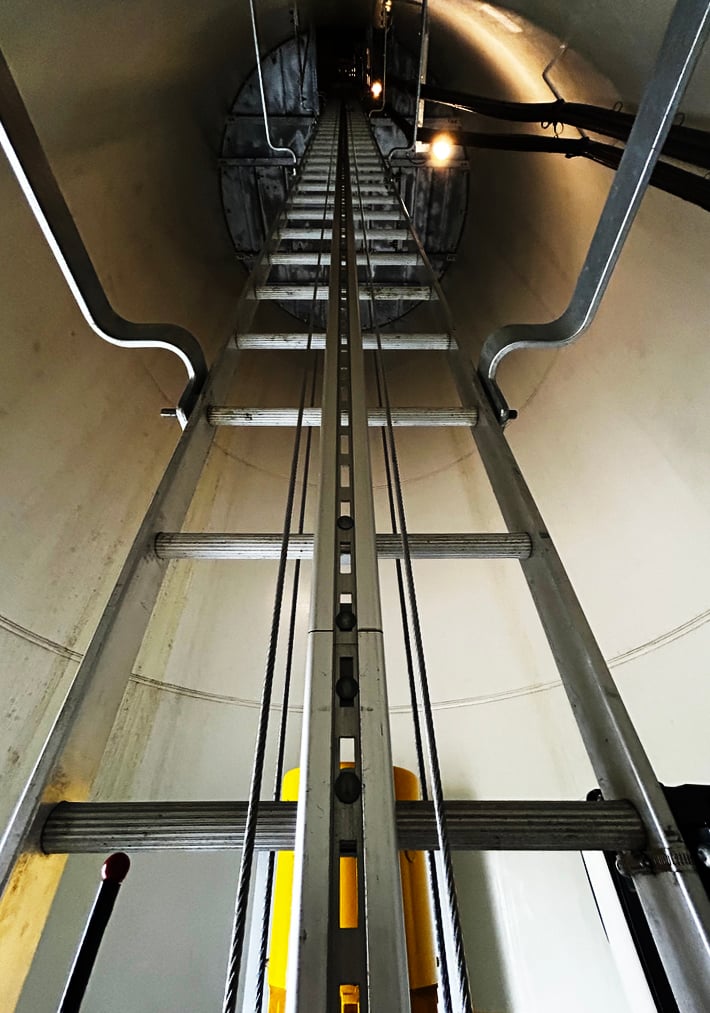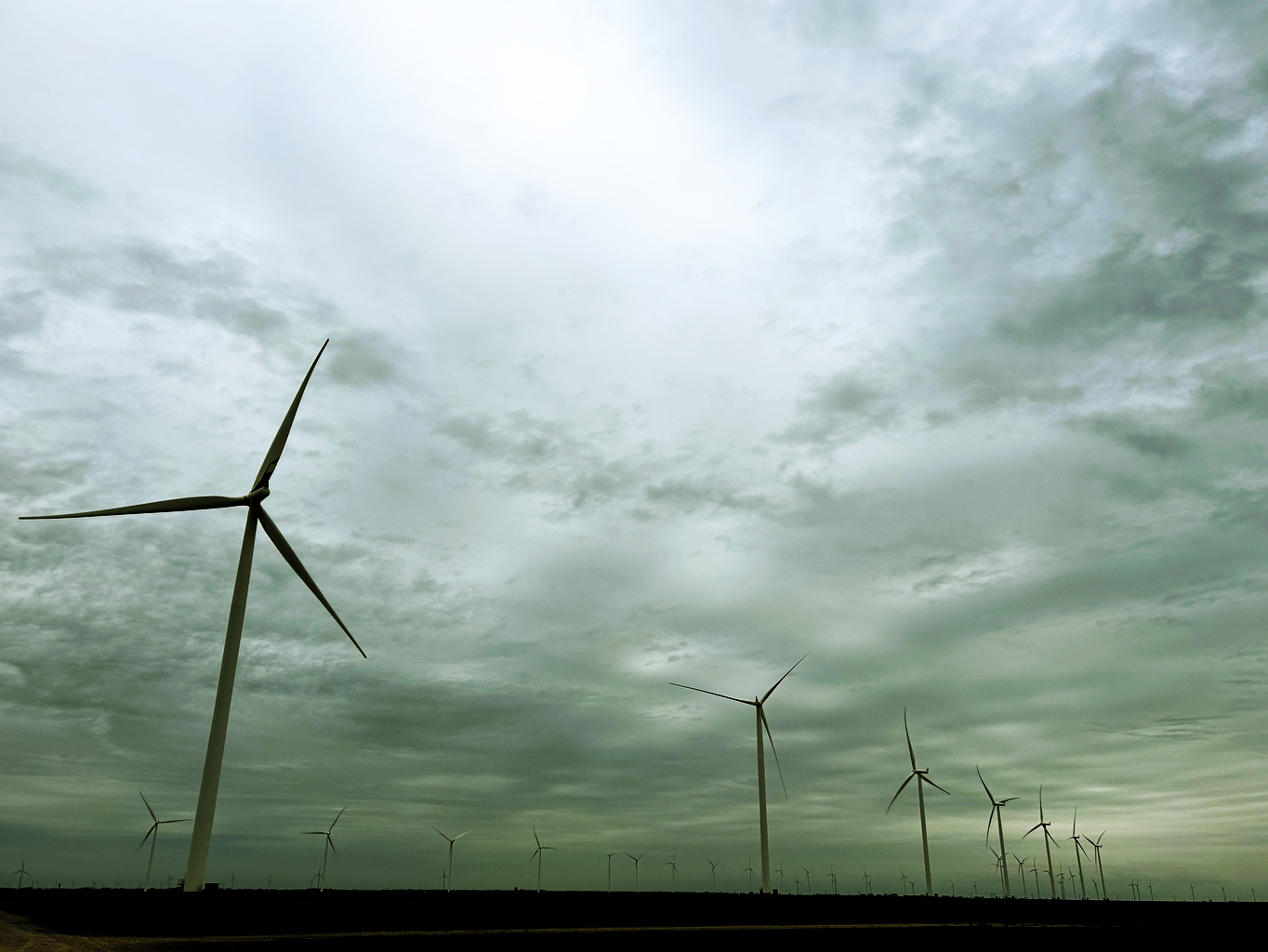News from the South - Texas News Feed
Inside Texas’ Largest Wind Farm
The wind blows from two directions to the Los Vientos Wind Farm, Texas’ largest and the nation’s second largest, with 426 turbines towering over Willacy and Starr counties in the Rio Grande Valley.
In one direction, the wind sweeps from the wintry north through the South Texas plains. In another, it rolls from the southeast over the chilly blue-green waters of the Gulf of Mexico, before meeting the warm Texas coast. These temperature differences produce gusts that blow inland at an average of 11 miles per hour, across the seashore saltgrass, across the sorghum and cotton fields, and across the farm-to-market roads, shaking cars, lashing palm trees, and whistling in the ears of those who live and work in the tiny town of Lyford, which sits in the Willacy County section of Los Vientos.
Here is where the nomadic Coahuiltecan Indians once roamed against the winds. Where the winds once caused ships of a scattered Spanish armada to wreck off the coast on Padre Island. Where Spanish colonists once named the area after the lake they called Laguna Del Como Se Llama, or “What’s-It-Called Lake.” Where two different railroad lines once brought white farmers from the Midwest, who settled the town and segregated Mexican-American families. Where each of the town’s three cotton gins once employed over 100 workers. Where the Lyford town center once had a hotel, a bank, a theater, several drug stores, and the county once had a hospital. All this was before the 1990s, when farms began to shrink, jobs dwindled, and local youth looked elsewhere to chase their dreams.

At a time when Lyford was in decline, Duke Energy Renewables arrived in 2012 to build the first phases of a massive new wind farm—installing 171 turbines across 23,000 acres of leased farmland here (an area roughly the size of Disney World), 30 miles west of the Gulf by U.S. Highway 69. The winds in this coastal region have proven lucrative. At least 10 more energy companies have built wind projects in the area, erecting turbines extending further than the eye can see. This section of Los Vientos is sandwiched between the larger cities of Raymondville to the north and Harlingen to the south, which has a technical college offering a wind energy tech degree. Residents there can see the turbines’ whirling blades by day and its hundreds of red pulsing lights by night.
The local wind energy boom has provided a small lifeline to the cash-strapped city and to Willacy County. Rick Salinas, a third-generation resident and former Lyford mayor, tells me wind farms have brought “good fortune” to the town—especially the tiny local school district, which has reaped new property tax revenue and direct contributions from the projects. The wind farm hires local residents for its technicians. And according to the company, now known as Deriva Energy after Brookfield Energy acquired Duke Energy’s renewable projects in 2023, it pays farmers up to $12,000 for each turbine standing on their land. Having dozens of turbines can potentially free (or at least lessen) a farmer’s dependence on cash crops and the harsh Texas weather.
Glenn Wilde has been farming cotton and grains in Lyford since his family moved to the area after World War II. The 62-year-old isn’t happy that the sky-scraping turbines have taken over the vast, once-open landscape. Still, he’s leased some of his land for turbines on his own farm and sees the upside. “This crazy wind ought to be worth something, right? It really blows down here, and so if we can capitalize on it, I’d love to see it.”
Each turbine has the capacity to generate nearly 2.5 megawatts of energy, meaning this section of Los Vientos can churn out up to 400 megawatts, enough to power 120,000 homes daily (San Antonio and Austin’s public electric utilities both buy the wind farm’s power). A cylindrical or rectangular hub is mounted atop each 300-foot tower, housing a generator and an anemometer that detects the direction and speed of the wind, oscillating or “yawing” the center hub of its three blades towards it. High-pressure air hits one side of the blade and low-pressure another, creating a lift that makes it spin. Lines from each turbine run underground to substations where the power generated is transformed to high-voltage energy that feeds the state’s grid.
When I arrived at the plant’s main building, its 23 technicians for the Willacy area had already wrapped up their morning safety meeting, received their assignments, and headed out to scale the turbines, troubleshooting the problems that inevitably arise on any given day. Each turbine is numbered, and, if one goes offline, the control center can easily identify it.
Working on the wind farm is a job for people who love the open land, the area plant manager Mason Price tells me. His father worked in the smog and grease of Houston’s shipping channel, but Price wanted something different. After finishing high school, he graduated from technical school and moved to the area to work at another wind farm before coming to Los Vientos. He’s been here for eight years.

Both farmers and wind energy producers in the area worry there aren’t enough transmission lines to deliver the energy generated by Los Vientos and other South Texas wind farms to the rest of the state, a growing problem that’s contributed to power emergencies for the Texas grid. The last major addition to the state’s transmission lines was in 2013. “Not only do we need more transmission lines, but we also need more generation on that transmission, and we need it fast,” says Deriva Energy spokesperson Mandy Meadors.
Locals like Salinas want to see the returns of this wind power stay in the community. Not head out in other directions, like many of the children born here, the energy generated here, or even the wind here, which eventually heads south.
The post Inside Texas’ Largest Wind Farm appeared first on www.texasobserver.org
News from the South - Texas News Feed
Frustrated with poor play against UTEP, Arch Manning will 'get back to basics'
SUMMARY: Texas quarterback Arch Manning and coach Steve Sarkisian acknowledge the team’s underwhelming offensive performance in a 27-10 win over UTEP. Manning completed 11 of 25 passes for 114 yards with a touchdown and an interception, frustrating fans expecting a stronger showing at home. Despite a rough first half with 10 consecutive incompletions, Manning showed flashes of promise and scored twice on the ground. Sarkisian emphasized Manning’s mental struggle rather than physical injury and expressed confidence in his growth and consistency. Manning committed to improving fundamentals and handling in-game pressure ahead of tougher matchups, including their SEC opener against Florida on Oct. 4.
The post Frustrated with poor play against UTEP, Arch Manning will 'get back to basics' appeared first on www.kxan.com
News from the South - Texas News Feed
Texas nursing students return from life-changing internship in Africa
SUMMARY: Two Texas nursing students, Tom Strandwitz and Valerie Moon, participated in Mercy Ships’ inaugural nursing internship aboard the Africa Mercy hospital ship in Madagascar. Selected from nationwide applicants, they gained hands-on experience in various departments, providing free surgeries and care in underserved regions. Their travel expenses were covered by over $11,000 raised through community GoFundMe campaigns. Both students were deeply impacted by patient interactions, such as cataract surgeries restoring sight and building trust with families. The internship broadened their perspectives on global health care. They plan to continue careers in intensive care and public health, with hopes to return to international nursing missions.
Read the full article
The post Texas nursing students return from life-changing internship in Africa appeared first on www.kxan.com
News from the South - Texas News Feed
Austin becoming FEMA-approved emergency alert authority, planning 1st test alert
SUMMARY: On Monday, Sept. 29, Austin will conduct a test of the Integrated Public Alert and Warning System (IPAWS), becoming a FEMA-approved alerting authority able to send emergency alerts via Wireless Emergency Alerts (WEA) to cell phones and Emergency Alert System (EAS) messages to TV and radio. This coordinated test at 3 p.m. will cover the city across its three counties—Travis, Hays, and Williamson. The alerts will clearly indicate a test and require no action. IPAWS allows authenticated, geotargeted emergency notifications without subscription, enhancing public safety communication. More details are available at ReadyCentralTexas.org and Ready.gov/alerts.
The post Austin becoming FEMA-approved emergency alert authority, planning 1st test alert appeared first on www.kxan.com
-
News from the South - Kentucky News Feed6 days ago
Lexington man accused of carjacking, firing gun during police chase faces federal firearm charge
-
News from the South - Arkansas News Feed7 days ago
Group in lawsuit say Franklin county prison land was bought before it was inspected
-
The Center Square6 days ago
California mother says daughter killed herself after being transitioned by school | California
-
News from the South - Arkansas News Feed6 days ago
Arkansas medical marijuana sales on pace for record year
-
News from the South - Missouri News Feed6 days ago
Local, statewide officials react to Charlie Kirk death after shooting in Utah
-
Local News6 days ago
US stocks inch to more records as inflation slows and Oracle soars
-
Local News Video6 days ago
William Carey University holds 'tailgates and tourniquets' blood drive
-
News from the South - Alabama News Feed6 days ago
Zaxby's Player of the Week: Dylan Jackson, Vigor WR














































